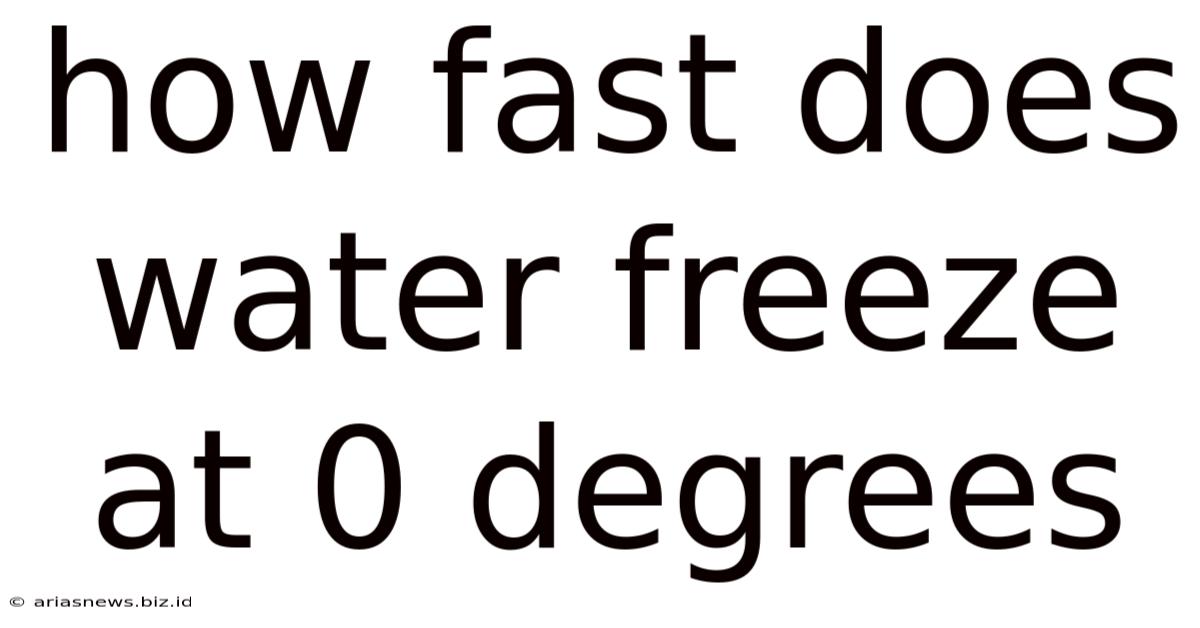How Fast Does Water Freeze At 0 Degrees
Arias News
May 11, 2025 · 5 min read

Table of Contents
How Fast Does Water Freeze at 0 Degrees Celsius? A Deep Dive into the Physics of Freezing
The simple answer is: it depends. While 0°C (32°F) is the freezing point of water, the time it takes for water to freeze at this temperature is influenced by a surprisingly large number of factors. This seemingly straightforward question opens a fascinating window into the complex world of thermodynamics and heat transfer. This article will delve into the science behind water freezing, exploring the variables that significantly impact freezing time and providing a deeper understanding of this common yet complex phenomenon.
Understanding the Freezing Process
Before we delve into the variables, let's establish a fundamental understanding. Freezing is a phase transition, a change in the physical state of a substance from liquid to solid. This transition occurs when the kinetic energy of water molecules decreases sufficiently, allowing them to form stable crystalline structures – ice. At 0°C, water can freeze, but it doesn't necessarily do so instantly. The process requires the removal of latent heat.
Latent heat is the energy absorbed or released during a phase transition without a change in temperature. In the case of freezing, water releases latent heat as it transitions from liquid to solid. This released energy must be dissipated into the surrounding environment for the freezing process to continue. This dissipation is the rate-limiting step.
Factors Affecting Freezing Time
Numerous factors influence how quickly water freezes at 0°C. These can be broadly categorized as:
1. Volume and Surface Area
The volume of water is a primary determinant. A larger volume of water requires the removal of a greater amount of latent heat, naturally extending the freezing time. Conversely, a smaller volume will freeze faster.
Surface area plays a crucial role. A larger surface area facilitates faster heat dissipation. Think of a shallow dish versus a tall, narrow container – the shallow dish will freeze faster because it exposes a greater surface area to the surrounding environment. This is why ice cube trays typically utilize small, shallow compartments.
2. Initial Temperature
The starting temperature of the water significantly influences freezing time. Water at a temperature substantially above 0°C requires more time to cool down to 0°C before freezing can even begin. The colder the initial temperature, the faster the freezing process.
3. Ambient Temperature and Conditions
The ambient temperature significantly impacts freezing. A significantly colder surrounding environment will lead to faster freezing than a marginally colder environment. This highlights the importance of heat transfer to the surroundings.
Air movement (or lack thereof) is equally critical. A breeze or wind current will increase heat dissipation, speeding up the freezing process. Conversely, still air acts as an insulator, slowing down freezing.
Insulation is a key consideration. A container insulated to reduce heat loss will slow freezing. Conversely, a container that conducts heat efficiently will expedite the freezing process. This explains why metal containers often freeze water faster than plastic or glass containers.
4. Impurities and Dissolved Substances
The presence of impurities and dissolved substances in the water affects its freezing point through a phenomenon called freezing-point depression. This means that the presence of solutes lowers the freezing point of the water. Therefore, pure water will freeze faster than water containing dissolved salts, sugars, or other substances.
5. Nucleation Sites
Nucleation is the initial formation of a solid phase within a liquid. This process requires specific sites, known as nucleation sites, where ice crystals can begin to form. The presence of these sites can significantly speed up the freezing process.
These sites can be microscopic imperfections in the container, dust particles in the water, or even air bubbles. If there are few nucleation sites, freezing might be delayed as the water needs to cool below 0°C (supercooling) before spontaneous nucleation occurs.
6. Pressure
Pressure also subtly influences the freezing point. Increased pressure slightly lowers the freezing point, while decreased pressure raises it. However, this effect is generally minor unless dealing with significantly high or low pressures.
Practical Applications and Examples
Understanding the factors influencing freezing time has numerous practical applications. Consider these examples:
- Ice Cube Trays: Designed with shallow compartments and often made of conductive materials to enhance heat transfer and promote faster freezing.
- Commercial Ice Production: Large-scale ice production utilizes optimized techniques, including efficient heat exchangers and controlled environmental conditions, to ensure rapid and consistent freezing.
- Freezing Food: Proper food freezing requires controlling temperature and minimizing air pockets to prevent ice crystal formation that can damage food quality.
- Cryopreservation: Freezing biological samples, such as cells or tissues, requires careful control of freezing rates to prevent cellular damage.
Conclusion: No Single Answer, But Many Factors
The question, "How fast does water freeze at 0 degrees?" doesn't have a simple numerical answer. The time it takes is a complex interplay of multiple factors, including the water's volume and initial temperature, the ambient temperature and conditions, the presence of impurities, and even the availability of nucleation sites. Understanding these factors is essential for controlling and optimizing freezing processes in various applications, from making ice cubes to preserving biological samples. By carefully considering these variables, we can better predict and manage the fascinating phenomenon of water freezing. The precise freezing time remains highly variable and context-dependent, illustrating the inherent complexity of seemingly simple physical processes. The more we understand these factors, the better equipped we are to control and utilize the freezing process effectively in diverse settings.
Latest Posts
Related Post
Thank you for visiting our website which covers about How Fast Does Water Freeze At 0 Degrees . We hope the information provided has been useful to you. Feel free to contact us if you have any questions or need further assistance. See you next time and don't miss to bookmark.